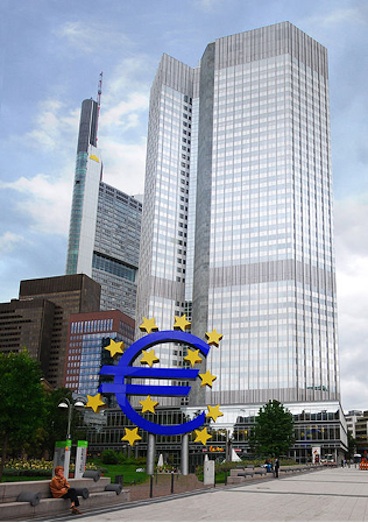European Council puts member states into straight-jacket of austerity
European Council puts member states into straight-jacket of austerity
On 17th June the leaders of Europe's governments adopted, as expected, a number of conclusions in relation to the economic crisis. It is disappointing to see the European Council laying such a one-sided emphasis on austerity. The thumbscrews are being turned, the sanctions on failure to make cuts increased. But any attention to rewarding work or effective measures against poverty is missing, while not a single word was said about the need for good public services. The only glimmer of light was that the heads of government were in agreement that surveillance of banks must be improved and that member states should introduce a bank levy.

The European Central Bank headquarters building in Frankfurt.
Last week was once more a Strasbourg week, but this really didn't bring much in the way of news. Most journalists were at the European Council, and got it all wrong. It was known in advance that during this meeting of government leaders decisions would be taken which would severely limit the options for national governments to organise their own economic policies.
Now the SP is not opposed to economic coordination. What happens in Germany will now have its effects on the Netherlands and so all European member states are to a growing extent stuck with each other. But we are opposed to a straight-jacket that is aimed only at forcing down budget deficits. I can explain this urge to austerity only with reference to the anxiety over renewed unrest on the financial markets: if the banks have insufficient confidence in the member states, they won't give any more loans and the whole system will reel. The government leaders took a number of measures to counter the speculative behaviour of financial institutions, but evidently had so little faith in this that they still wanted cuts in order that the banks would have to have confidence in them. The heads of government were thus kept on the speculators' leash.
The European Council also laid down the principal aims of Europa 2020. This programme is aimed at making Europe more competitive, but there was also the possibility that in addition to spending cuts, the fight against poverty, as well as public investments, could have been on the agenda. The aims, however, remained milk-and-water: so, a chance missed.
You might ask yourself how democratic all of this is. Who in the Netherlands now knows that last week important decisions were being taken? Who knows that whatever new government comes into office, the budget from henceforth will first have to pass by Brussels to see whether it contains enough spending cuts? Sure, there was a short debate in our national parliament. And yes, the European Parliament also adopted a resolution on the matter. Nevertheless, my impression is that the heads of government were not listening to either the public or their parliaments, but above all to the wishes of the bankers and speculators.
The European Council is growing ever more important: it would be a good thing if our national parliament and the European Parliament could gain more influence on its decision-making. Otherwise we will find ourselves increasingly in a situation where the real power lies with Sarkozy and Merkel, following their consultations with the financial lobby.
- See also:
- Dennis de Jong
